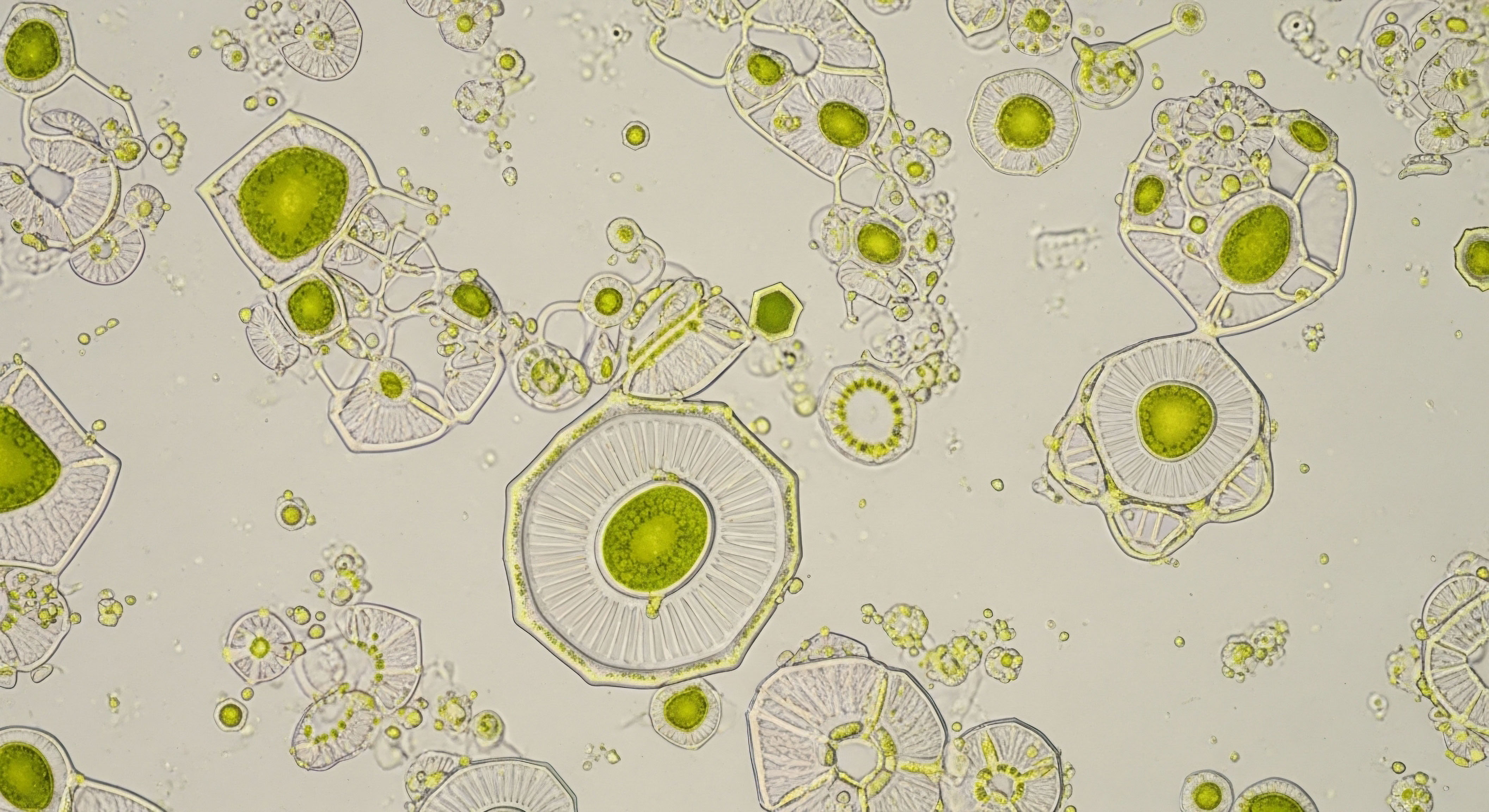

Fundamentals
You feel it as a subtle shift in your body’s internal rhythm. The energy that once propelled you through demanding days now seems to wane, and you find yourself questioning if this is an inevitable consequence of aging.
Your concern is valid, and it originates from a deep, intuitive understanding that your vitality is linked to the intricate communication network within your cells. This network, the endocrine system, uses hormones as its primary language. When we discuss the long-term effects of optimizing this system, especially concerning cardiovascular health, we are truly asking how we can restore the clarity and precision of this internal dialogue for the benefit of the entire body.
The heart and its vast network of vessels are not passive tubes and pumps. They are dynamic, responsive tissues, constantly adapting to the body’s needs under the direction of hormonal signals. Testosterone, for instance, plays a direct role in maintaining the health of the endothelium, the delicate inner lining of your blood vessels.
A healthy endothelium is flexible and produces substances like nitric oxide, which allows vessels to relax and expand, promoting healthy blood flow and pressure. When testosterone levels decline, this signaling can weaken, contributing to vascular stiffness and a reduced capacity for repair. This is a primary mechanism through which hormonal imbalance begins to influence cardiovascular wellness.
Understanding hormonal health is the first step toward reclaiming biological function and vitality.

Why Hormones Matter for Your Heart
The connection between your hormones and your heart extends deep into your body’s metabolic machinery. Consider the processing of fats and sugars, a critical function for maintaining cardiovascular health. Hormones are the master regulators of this process. Optimal testosterone levels are associated with favorable lipid profiles, including the management of low-density lipoprotein (LDL) cholesterol.
Simultaneously, these hormones improve the body’s sensitivity to insulin, allowing for more efficient use of glucose and preventing the metabolic dysregulation that can lead to arterial damage over time. When these hormonal signals fade, the body’s ability to manage these metabolic stressors diminishes, creating an environment where cardiovascular risk factors can accumulate.

The Systemic Influence on Cardiovascular Tissues
Your body operates as an integrated system. A decline in hormonal signaling in one area creates ripple effects throughout the entire organism. For the cardiovascular system, this means that hormonal health influences more than just blood vessels and cholesterol. It modulates inflammation, the body’s response to injury and stress.
Chronic, low-grade inflammation is a well-established driver of atherosclerosis, the process by which plaques build up in arteries. Well-regulated hormonal environments help to control this inflammatory response, protecting cardiovascular tissues from this persistent, silent threat. By viewing your symptoms through this systemic lens, you can begin to see hormone optimization as a protocol aimed at restoring fundamental biological order and resilience.


Intermediate
When we move from the foundational ‘why’ to the clinical ‘how,’ we begin to examine the specific protocols designed to recalibrate the body’s endocrine system. These interventions are designed to restore hormonal messages to levels associated with youthful vitality and optimal function.
For men experiencing the symptoms of andropause, a standard protocol involves weekly intramuscular injections of Testosterone Cypionate. This method ensures stable, predictable levels of testosterone in the bloodstream, avoiding the peaks and troughs that can accompany other delivery methods. This biochemical recalibration is a precise process, aimed at re-establishing a physiological state that supports cardiovascular health.
The protocols extend beyond simply replacing testosterone. They are designed to manage the body’s complex hormonal feedback loops. For example, administering exogenous testosterone can signal the body to reduce its own natural production. To counteract this, Gonadorelin is often included.
It is a peptide that mimics the action of gonadotropin-releasing hormone (GnRH), stimulating the pituitary gland to maintain testicular function. This integrated approach supports the entire Hypothalamic-Pituitary-Gonadal (HPG) axis, promoting a more holistic and sustainable state of hormonal balance.

Managing Estrogen and Other Key Factors
A critical component of male hormone optimization is managing the conversion of testosterone to estrogen. While estrogen is vital for men’s health in small amounts, excessive levels can lead to unwanted side effects and may have complex effects on cardiovascular health.
Anastrozole, an aromatase inhibitor, is frequently prescribed to block this conversion, ensuring the ratio of testosterone to estrogen remains within an optimal range. This meticulous management of hormonal metabolites is a key feature of a properly supervised protocol. Similarly, for women, balancing testosterone with progesterone is tailored to their menopausal status, acknowledging the unique interplay of their hormonal symphony.
Effective hormone optimization protocols are comprehensive, addressing feedback loops and metabolic byproducts.
The scientific community has rigorously investigated the cardiovascular implications of these therapies. For years, conflicting data created uncertainty. However, a landmark 2023 study published in the New England Journal of Medicine provided significant clarity. This large-scale trial, involving over 5,200 men, demonstrated that testosterone replacement therapy did not increase the risk of major adverse cardiovascular events like heart attack or stroke compared to a placebo.
This finding has been reassuring for clinicians and patients, confirming that restoring testosterone to normal physiologic levels is a safe strategy for appropriately selected individuals.

A Comparative Look at Benefits and Risks
While the overall safety profile is reassuring, a responsible clinical approach involves a clear-eyed assessment of all potential physiological effects. The goal is to maximize the profound benefits while vigilantly monitoring for and managing potential risks. The table below outlines these considerations, which form the basis of the ongoing dialogue between a patient and their physician.
| Cardiovascular Consideration | Observed Effect of TRT | Clinical Management Strategy |
|---|---|---|
| Lipid Profile |
Often results in a reduction of total cholesterol and LDL (“bad”) cholesterol. The effect on HDL (“good”) cholesterol can be variable. |
Regular monitoring of lipid panels to ensure a favorable overall cholesterol and triglyceride profile. Lifestyle and diet interventions are complementary. |
| Blood Flow & Vasodilation |
Testosterone supports endothelial function and nitric oxide production, which can improve blood flow and relax blood vessels. |
Blood pressure monitoring is a standard part of follow-up visits. Patients often report improved exercise capacity and reduced angina symptoms. |
| Erythrocytosis |
Testosterone can stimulate the bone marrow to produce more red blood cells, increasing hematocrit levels. This can thicken the blood. |
Regularly monitoring hematocrit levels is mandatory. Dosage adjustments or therapeutic phlebotomy may be used if levels exceed the safe range. |
| Fluid Retention |
Hormonal shifts can sometimes lead to sodium and water retention, which can be a concern for individuals with pre-existing heart failure. |
Careful screening for cardiac conditions prior to therapy. Monitoring for signs of edema and managing with dose adjustments or diuretics if necessary. |

What Are the Implications for Female Cardiovascular Health?
For women, the conversation around hormone optimization and cardiovascular health is equally important. The decline of estrogen and progesterone during perimenopause and post-menopause is associated with an increased risk of cardiovascular disease. Thoughtful hormone replacement, often including low-dose testosterone, can help mitigate these risks.
Testosterone in women contributes to lean muscle mass, metabolic health, and vascular function. Protocols for women, which may involve weekly subcutaneous injections of Testosterone Cypionate and appropriate progesterone support, are designed to restore the protective benefits of a balanced hormonal state, tailored specifically to female physiology.


Academic
A sophisticated examination of hormone optimization’s long-term cardiovascular effects requires a deep dive into the molecular and physiological mechanisms governing vascular homeostasis. Testosterone’s influence is not a blunt instrument; it is a pleiotropic signaling molecule that interacts with a multitude of pathways.
Its primary cardiovascular benefits are mediated through both genomic and non-genomic actions on endothelial cells, vascular smooth muscle cells, and macrophages within atherosclerotic plaques. Genomically, testosterone modulates the expression of genes involved in lipid metabolism and inflammatory responses. Non-genomically, it can rapidly induce vasodilation through its effects on ion channels and nitric oxide synthase (eNOS) activity, a critical enzyme for endothelial health.
The historical controversy in the literature often stemmed from the methodological limitations of early observational studies. These studies sometimes failed to adequately control for confounding variables or to differentiate between physiologic and supraphysiologic testosterone levels. The 2010 Testosterone in Older Men (TOM) trial, for example, was halted prematurely due to a higher incidence of cardiovascular events in the treatment group.
However, this study involved frail, elderly men with limited mobility and a high burden of pre-existing comorbidities, making it difficult to generalize the findings to a broader population of hypogonadal men. This highlights a critical principle in endocrinology ∞ context and patient selection are paramount.

Reconciling the Evidence through High Quality Trials
The evolution in understanding has been driven by more robust research, culminating in large-scale, randomized controlled trials (RCTs). The TRAVERSE Trial (Testosterone Replacement Therapy for Assessment of Long-term Vascular Events and Efficacy Response in Hypogonadal Men), reported in 2023, represents the most definitive evidence to date.
This RCT was specifically designed to assess cardiovascular safety in middle-aged and older men with hypogonadism and elevated cardiovascular risk. Its finding of non-inferiority for major adverse cardiovascular events between the testosterone and placebo groups provided a high degree of confidence that restoring testosterone to a normal physiological range does not increase this risk.
The scientific consensus is evolving toward cardiovascular safety for physiologic testosterone replacement, supported by large-scale randomized controlled trials.
This does not erase the need for vigilance regarding known side effects. The most significant of these, from a cardiovascular standpoint, is the potential for erythrocytosis. Testosterone directly stimulates erythropoietin (EPO) production in the kidneys, which in turn drives red blood cell production in the bone marrow.
An excessive increase in hematocrit raises blood viscosity, which can increase the risk of thromboembolic events. This is a predictable and manageable effect, and its monitoring is a cornerstone of responsible therapy. The slight increase in atrial fibrillation incidence noted in the TRAVERSE trial also warrants consideration, suggesting a potential arrhythmogenic effect in a small subset of susceptible individuals that requires further investigation.

A Summary of Pivotal Research Findings
The journey to our current understanding has been built upon decades of research. Examining the key studies reveals a progressive refinement of both methodology and clinical interpretation. The following table provides a high-level overview of this scientific progression.
| Study/Analysis | Year | Design Type | Key Cardiovascular Finding |
|---|---|---|---|
| TOM Trial |
2010 |
RCT |
Halted early due to increased cardiovascular events in a frail, elderly population. |
| Vigen et al. Analysis |
2013 |
Retrospective Cohort |
Initially suggested an increased risk of mortality and cardiovascular events, but methodology was heavily debated. |
| Cheetham et al. Study |
2017 |
Retrospective Cohort |
Found a lower risk of cardiovascular outcomes in androgen-deficient men who received TRT over a median of 3.4 years. |
| TRAVERSE Trial |
2023 |
Large-Scale RCT |
Demonstrated that TRT was non-inferior to placebo for major adverse cardiovascular events in men with hypogonadism. |

How Does Peptide Therapy Interface with Cardiovascular Health?
The discussion of hormonal optimization is expanding to include growth hormone peptide therapies, such as Sermorelin and Ipamorelin/CJC-1295. These peptides stimulate the body’s own production of growth hormone (GH). GH and its mediator, IGF-1, have beneficial effects on body composition, such as reducing visceral adipose tissue and increasing lean muscle mass.
These changes are intrinsically linked to improved metabolic health and a reduction in long-term cardiovascular risk. Research into these peptides suggests they may improve endothelial function and have positive effects on lipid metabolism, representing another frontier in using targeted hormonal strategies to support long-term cardiovascular wellness.
- Sermorelin/Ipamorelin ∞ These Growth Hormone Releasing Hormone (GHRH) analogues and ghrelin mimetics work by stimulating the pituitary gland. Their primary benefit for cardiovascular health is indirect, stemming from improved body composition, reduced visceral fat, and enhanced insulin sensitivity.
- PT-141 ∞ While primarily used for sexual health, its mechanism involves melanocortin receptors, which are also implicated in inflammation and metabolic regulation, suggesting a broader systemic influence that is an active area of research.
- Future Research ∞ The long-term cardiovascular outcomes of peptide therapies are a subject of ongoing investigation. Current data is promising, particularly regarding their effects on metabolic risk factors, but large-scale, long-term trials are needed to establish definitive safety and efficacy profiles comparable to those available for testosterone.

References
- Khaw, K. T. et al. “Endogenous testosterone and mortality due to all causes, cardiovascular disease, and cancer in men ∞ European prospective investigation into cancer in Norfolk (EPIC-Norfolk) prospective population study.” Circulation, 116.23 (2007) ∞ 2694-2701.
- Lincoff, A. M. et al. “Cardiovascular Safety of Testosterone-Replacement Therapy.” New England Journal of Medicine, 389.2 (2023) ∞ 107-117.
- Basaria, S. et al. “The Testosterone in Older Men with Mobility Limitations (TOM) trial ∞ a randomized, double-blind, placebo-controlled trial.” The Journal of Clinical Endocrinology & Metabolism, 95.5 (2010) ∞ 2048-2058.
- Jones, T. H. et al. “Testosterone replacement in hypogonadal men with type 2 diabetes and/or metabolic syndrome (the TIMES2 study).” Diabetes care, 34.4 (2011) ∞ 828-837.
- Traish, A. M. “Testosterone and cardiovascular disease ∞ an old idea with modern clinical implications.” The Journal of Clinical Endocrinology & Metabolism, 105.6 (2020) ∞ dgaa116.
- Morgentaler, A. & Khera, M. “Testosterone and the Heart ∞ What We Have Learned in the Past 5 Years.” The Journal of Sexual Medicine, 17.5 (2020) ∞ 855-867.
- Cheetham, T. C. et al. “Association of testosterone replacement with cardiovascular outcomes among men with androgen deficiency.” JAMA Internal Medicine, 177.4 (2017) ∞ 491-499.
- English, K. M. et al. “Testosterone acts as a coronary vasodilator by a direct effect on smooth muscle.” BMJ, 324.7349 (2002) ∞ 1326.
- Shah, P. K. “Testosterone and Cardiovascular Disease.” Cedars-Sinai, 2024.
- Vigen, R. et al. “Association of testosterone therapy with mortality, myocardial infarction, and stroke in men with low testosterone levels.” JAMA, 310.17 (2013) ∞ 1829-1836.

Reflection

Charting Your Own Biological Course
The data and the clinical science provide a map, detailing the known territories of hormonal health and cardiovascular wellness. We have seen how restoring the body’s intricate signaling can support the very systems that define our vitality. We have examined the evidence, weighed the benefits, and acknowledged the parameters for safe and effective management. This knowledge transforms ambiguity into understanding, giving you a framework for interpreting your own body’s signals.
Your personal health journey is unique. The information presented here is the beginning of a conversation, a set of coordinates from which to start. The true work lies in applying this understanding to your individual biology, in partnership with a clinician who can help you navigate the terrain.
What are your specific symptoms telling you? What does your personal and family health history suggest? How do these scientific findings intersect with your own lived experience? The path forward is one of proactive engagement, using this knowledge as a tool to ask deeper questions and to take ownership of the incredible, complex, and resilient system that is your body.



